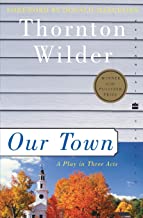Our Town: A Play in Three Acts, Thornton Wilder 1938
Almost everyone of a certain age has seen, read, or acted in Our Town, Thornton Wilder’s classic play about life and death in small town America, Grovers Corners, New Hampshire to be precise. I re-read this play after reading an article in the Sunday NYT that indicated that a new book about it was forthcoming. The article also interviewed a number of actors who had played Emily Webb, ranging from a student production at the U of Washington in the 1950’s to more recent, modern treatments. I was also moved to re-read the play because it was my only thespian experience having played Wally Webb (two lines in Act 2 and then a silent role in Act 3 in the graveyard after my appendix burst on a camping trip) in a high school production more than 70 years ago.
I was not disappointed. The play continues to be moving and powerful in a very understated way. Rural NH in 1901 was idyllic—everyone knew their neighbors and often married the boy or girl next door; milk was delivered by horse cart daily; the constable’s only job was to occasionally roust a drunken workman; WWI was not even on the horizon. This is the backdrop for the relationship between George Gibb and Emily Webb who marry in Act 2 and are the centerpiece for the cemetery scene in Act 3 (spoiler’s alert!!!) after Emily dies in childbirth.
The Stage Manager provides the rolling commentary but it’s the conversation between the dead in the cemetery in Act 3 that provides the ‘take home message’ from newly deceased Emily who has just re-visited her 12th birthday in the land of then then living: “Live people just don’t understand, do they?…They’re sort of shut up in little boxes, aren’t they? It goes so fast. We don’t have time to look at one another. …Oh earth, you’re too wonderful for anybody to realize you….Do any human beings realize life while they live it—every, every minute?” Simple words and simple observations, but Emily had to die in order to make them.
‘Our Town’ won the Pulitzer Prize for Wilder in 1938, one of three he won (the novel ‘Bridge of San Luis Rey’ and the play, ‘The Skin of our Teeth’) to go with his National Book Award for ‘The Eighth Day’. He’s not read quite so widely now, but I have a feeling that ‘Our Town’ will still be being performed from Broadway to high school and summer camp performances many decades from now. Well worth reading again.



